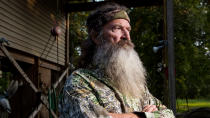Shunning Reality TV? Consider This

Too frou frou for Honey Boo Boo?
Could never fist pump to Jersey Shore?
You’re not alone. Millions of people worldwide suffer reality TV elitism, a condition you might call Shunscripted Syndrome.
Symptoms include extreme aversion to TLC, pejorative use of the word Housewives, eye rolling, dry mouth, nausea, constipation and an unrelenting urge to ask others, “What has become of television these days?”
While not yet acknowledged by the Journal of the American Medical Assn., Shunscripted Syndrome unmistakably exists, as David Craig, senior lecturer at USC’s Annenberg School recognizes.
“Sure, there’s a rhetorical strategy at play where we take a moment to look at whether these types of reality programs are contributing to a better society,” Craig remarks. “But by dismissing an entire genre of programming because of a few shows, you do dismiss the value of very well-crafted, nuanced and clever reality shows that are operating as media interventions into culture.”
In fact, unsubstantiated studies have shown that TV elitists tend to snub compelling reality fare — including MTV’s recent breakout Catfish and A&E’s laugh-out-loud Duck Dynasty — by referencing the puke-and-rally ways of Bad Girls Club and the, well, you know, of Keeping Up With the Kardashians.
Specialists in Shunscripted Syndrome understand that cable networks are not helping to ease this affliction. One network routinely refers to its programming — with pride — as “noisy,” thereby isolating viewers with delicate auditory systems along with auds who say, “Why do we need this much shrieking?” Also, just how many weaves can be torn from the scalps of scorned women within a half-hour? Answer: Don’t answer that.
The key to overcoming Shunscripted Syndrome is to understand that the basis of the discrimination lies in an urge to lump all reality fare into a stereotypical hodgepodge of fake nails, fake breasts, fake tans and fake storylines. While certain highly publicized programs do fit that plastic bill, a great deal of unscripted programming still adheres to its roots — back when “reality” was simply “nonfiction” — as seen with shows like Intervention, a range of travel series, Lock Up, gameshows and today’s slew of biz makeover programs.
As tolerance levels for reality TV are low for those suffering from Shunscripted Syndrome, a slow integration of unscripted fare into one’s weekly TV viewing habits is essential. CNBC’s recently launched primetime lineup boasts reality shows that are about as innocuous as the rest of CNBC’s lineup, so long as you don’t count the wacky Mad Money With Jim Cramer. Anthony Bourdain’s new CNN show Parts Unknown is another solid introductory option to the unscripted realm, blending dry humor with obscure locations. And, for what it’s worth, Twitter loves it — I checked.
Should bouts of anxiety still arise when commercials for reality shows like Long Island Medium air, a prescription for Chill Pill may help ease symptoms. Also, when those moments happen, medical professionals advise that you “loosen up, dude, seriously.”
After all, beyond the satire, reality TV is one of the most compelling genres of entertainment available today. And while today’s Bridezillas may be a far cry from HBO’s iconic nonfiction series Taxicab Confessions, reality TV still has the ability to shock, conjure laughs, provoke thought, induce cringes, bore, titillate, sadden, and uplift, all while providing commentary on modern society in a way far more explicit than scripted programming.
Besides, shouldn’t we all get back to believing we are above lowbrow action films and tacky B-movie horror pics? Remember those days? For the ostracized programs of reality TV, that may be just what the doctor ordered.
Related stories
New Shine Boss Rich Ross Finds Life After Disney
Warner Bros. Sets Bar High for Latest – and Priciest – Incarnation of Superman
Cable TV Still Locked to the Box
Get more from Variety.com: Follow us on Twitter, Facebook, Newsletter
